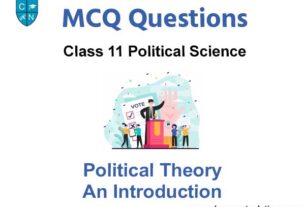Check the below NCERT MCQ Class 11 Political Science Chapter 9 Peace with Answers available with PDF free download. MCQ Questions for Class 11 Political Science with Answers were prepared based on the latest syllabus and examination pattern issued by CBSE, NCERT and KVS. Our teachers have provided below Peace Class 11 Political Science MCQs Questions with answers which will help students to revise and get more marks in exams
Peace Class 11 Political Science MCQs Questions with Answers
Refer below for MCQ Class 11 Political Science Chapter 9 Peace with solutions. Solve questions and compare with the answers provided below
Question. The Cuban Missile Crises ended with the
(a) Intervention of UN
(b) the defeat of USSR in the cold war
(c) Cuba’s defeat
(d) Withdrawal of missiles by USSR
Answer
D
Question. What is very essential for the progress of humanity?
(a) Terrorism
(b) Cold War
(c) Peace
(d) Wa
Answer
C
Question. FLN (National Liberation Front) led the independence movement of
(a) Algeria.
(b) Nigeria.
(c) Congo.
(d) Zimbabwe.
Answer
A
Question. To introduce a peace award for your class, the quality you would look for in your fellow students is
(a) Fanaticism.
(b) Intolerance.
(c) Passivity.
(d) Compassion.
Answer
D
Question. Which one of the following is the element of peace?
(a) Justice
(b) Terrorism
(c) Cold War.
(d) War.
Answer
A
Question. The Cuban Missile Crisis illustrated
(a) NATO formation.
(b) De-Stalinization.
(c) Policy of containment.
(d) Cold war era.
Answer
D
Question. For Gandhiji, what was the supreme virtue?
(a) War
(b) Communation
(c) Ahimsa
(d) Terrorism
Answer
C
Question. Martin Luther King, Jr., worked for racial equality and civil rights in
(a) Spain.
(b) France.
(c) South Africa.
(d) United States of America.
Answer
D
Question. According to realist theory, the main actors in international politics are
(a) Superpowers
(b) Nation states
(c) Countries of the European Union
(d) International organisations
Answer
B
Question. which is the form of structural violence?
(a) inequality
(b) caste discrimination
(c) patriarchy
(d) all of the above
Answer
D
Question. Who among he following preached peace?
(a) Bernard Shah
(b) Mussolini
(c) M.K. Gandhi
(d) F. Nietzsche
Answer
D
Question. where is rwanda?
(a) africa
(b) asia
(c) america
(d) europe
Answer
A
Question. pacifists view on non violence?
(a) love
(b) truth
(c) eliminating structural violence
(d) all of the above
Answer
D
Question. According to Balance of Power theory, the main objective of states is
(a) Preservation of international law.
(b) Regional peace.
(c) Maximize gains of globalisation.
(d) Self preservation.
Answer
D
Question. Which is not the example of structural violence?
(a) Untouchability
(b) Colonialism
(c) Communalism
(d) Cold war
Answer
A
Question. Which type of war is a war without arms?
(a) Terrorism
(b) Cold War
(c) Peace
(d) War
Answer
B
Question. From the following, find out the form of structural violence:
(a) Caste hierarchy
(b) Class difference
(c) Colonialism
(d) all of these
Answer
D
Question. thinker who promoted war?
(a) nietzche
(b) pareto.
(c) both of above
(d) none of the above
Answer
C
Question. The core business of UN peacekeeping operations does not include
(a) Rule of law related activities.
(b) Protection and promotion of human rights.
(c) Socio-economic recovery and development.
(d) Electoral assistance.
Answer
C
Question. Pacifists attach supreme value to:
(a) Liberty and equality.
(b) Human security and international laws.
(c) Coercion and force.
(d) Peace and opposition to war.
Answer
D
Question. Method to prevent war:
(a) International Law
(b) Balance of Power
(c) International Organisation
(d) All of the above
Answer
D
Question. Which is not the element of peace?
(a) Justice
(b) Truth
(c) Honesty
(d) Selfishness
Answer
D
Question. what are the challenges to peace?
(a) environmental problem
(b) weapons of mass destruction
(c) terrorism
(d) all of the above
Answer
D

We hope you liked MCQ Class 11 Political Science Chapter 9 Peace with answers provided above. In case you have any questions please post them in the comments section below and our Political Science teachers will provide a response.

